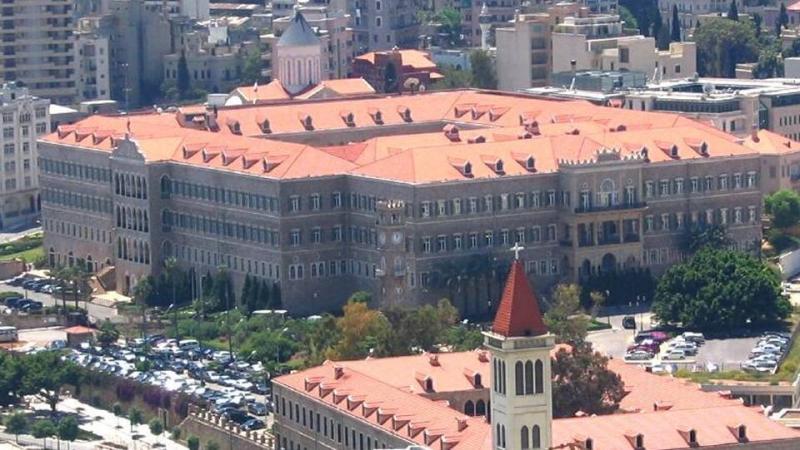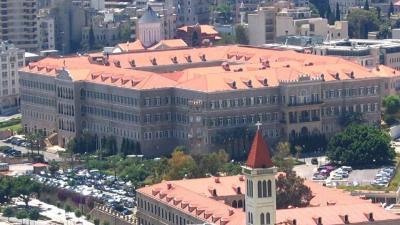The last session held by the cabinet reiterated the political alignments that this time took on a sectarian character, as the position of the "National Free Movement" met with that of the "Lebanese Forces" regarding the refusal to participate in the session before electing a president for the republic, despite each party coming from different backgrounds, according to the "Forces" party. This stance came on the eve of the ninth parliamentary session to elect a president, which is expected to resemble its predecessors due to the lack of consensus on a single candidate, with the two largest Christian parties ("Forces" and "National Free") rejecting the candidacy of the head of the "Maronite" movement, Sleiman Franjieh, for the presidency.
This convergence in position between the "Forces" and "National Free" reflected a new image of political alignments after the government session last Monday, without transforming into alliances different from previous ones, albeit taking on a sectarian aspect, considering that Christians reject "normalization" with the presidential vacancy, especially since the president represents the head of the executive authority in the country and presides over cabinet meetings without voting in them, with his powers transferring to the government collectively during the vacancy of the presidency.
Member of the "Strong Republic" bloc, MP Fadi Karam, rejected describing this new alignment as "sectarian," stating, "to prevent distorting the image of the current conflict." While he affirmed that there is convergence with the "National Free Movement" on this issue, he explained to "Asharq Al-Awsat" that, fundamentally, "it is not a complete convergence; because our starting points as Lebanese Forces differ from those of the Movement," explaining that the Forces "insist on preserving the constitution and democracy, a principle that can converge with any team and any party, whether Christian or non-Christian."
Karam added that the "Forces" do not see that the government should be convened for an emergency or necessary reason, but rather that the reason must be both emergency and urgent; however, the logic dictates that the priority should be to elect a president. As for the "Movement," "it obstructs, and its position has nothing to do with ours, while there are parties sharing the Forces’ position which are not Christian," he added, “It is a conflict between those who respect the country’s constitution and laws and seek to restore institutional order, and those who see no need for that, and all that matters to them is remaining in power,” referring to the "National Free Movement," while simultaneously denying that there are any meetings or coordination with the "Movement," instead stating that meetings between the deputies of the two blocs are limited to parliamentary committee sessions.
The hypotheses are expanding regarding the conditions that led to the convergence in this matter, and whether both parties meet on the rejection of Franjieh for the presidency, in light of the fluctuating alliance between the "Movement" and "Hezbollah" regarding Hezbollah's support for Franjieh, a stance rejected by the head of the Movement, Gebran Bassil. However, Karam clarifies the position by saying that the Movement's disagreement with "Hezbollah" is due to the nomination of Franjieh, "If there was an agreement between them, the problem would not have arisen between them." The "Forces" stance is "clear that we will not support a candidate belonging to the resistance camp," reiterating that their starting points differ, and their rejection of Franjieh "does not unite us in the presidential file; because the starting points differ, and we also reject Bassil’s candidacy for the presidency."
The "Forces" have rejected several offers to support Franjieh's candidacy for the presidency. Sources told "Asharq Al-Awsat" about indirect discussions meant as a "pulse check" initiated by representatives of "Amal Movement" toward the possibility of the "Forces" supporting Franjieh, while there was contact between representatives of Franjieh and representatives of the "Forces" for this purpose. Last week, Minister of Information Ziad Makari, close to Franjieh, sent a public message to the "Forces," stating that any agreement with Franjieh does not need to be written down as he adheres to what he says and commits to. However, the "Forces" rejected these proposals.
At the same time, there was indirect communication between the "Forces" and the "National Free Movement" regarding a candidate they could agree on, with the "Forces" appearing inclined toward Army Commander Joseph Aoun as an alternative candidate, should they fail to secure MP Michel Moawad’s election to the presidency, a proposal rejected by Bassil who suggested former Minister Ziad Baroud, which the "Forces" did not express enthusiasm for and seemed dismissive of.
While MP Karam did not delve into names and facts, he told "Asharq Al-Awsat" that there are "many offers from all parties because the (Forces) have become the natural course for the presidency given that they form the largest parliamentary bloc, capable of determining the balance of candidates in the presidential election, being the largest Christian party represented in parliament, making it natural for them to play a role, and hence various parties are trying to win them over." He added, "Because the Forces are principled and know what they want from the presidency, various initiatives and proposals are being made; we set specifications before the commencement of the battle, summarized in the need for the president to be sovereign and rescuing, and someone capable of carrying this rescue project, without compromise or appeasement. The aims of the Forces are known; they reject any understanding with parties based on the logic of allocation for the coming years. For us in the coming years, it is either rescuing Lebanon or maintaining approaches as they are, which would lead to Lebanon's end."
The fate of today’s parliamentary session is expected to be similar to its predecessors, amidst deep divisions between political blocs over the candidates. A candidate needs a two-thirds majority, which is 86 votes to win, and the required majority becomes 65 votes in a second round of voting, out of a total of 128 members of parliament. As with every week, the first round convenes with the attendance of a two-thirds majority, before deputies withdraw, causing the quorum to be dropped in the second round, while no political faction holds a parliamentary majority that would allow them to impose their candidate.




